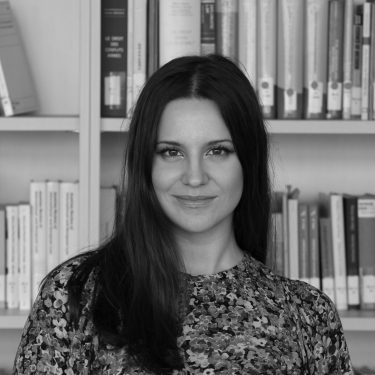Welcome to the first Interview that kicks off the symposium ‘The Person behind the Academic’! For this very special interview, I could not have wished for another guest than Mando Rachovitsa, a person who has had a special impact on my personal work and research interests through her lectures and writings. Welcome Mando and thank you very much for accepting our invitation!
We have met each other at the University of Groningen, where I attended your lectures on international dispute settlement. I remember vividly that in these lectures, we (the students) were called upon to question our learnt doctrinal view on various aspects of international law. I have, thus, assumed that you oppose a solely doctrinal way of thinking… Is that indeed the case?
Well, as most international lawyers, I have a doctrinal/positivistic upbringing. Aren’t most of us Ian Brownlie’s children? (laughs) But a solely doctrinal way of studying international law is like having on a pair of sunglasses that enable one to understand and experience international affairs only in black and white; that is the doctrinal lens of sources and actors in international law. Let’s just say that I prefer understanding international law by using more lenses so as to see around us more nuance and colour. In order to be able to ask “why?”, “how did we get here?” or “could things be different?” (and not just questions pertaining to the interpretation and application of the law as it stands) we need different methodologies, tools and ways of thinking.
Which are 3 books that you would recommend doctrinal legal researchers to read? To which extent have these books changed your perception of international law?
If I had to pick three, I would recommend:
First, Problems and Process: International Law and How We Use It, by Rosalyn Higgins. It gave me a very good grasp of international law as a process and how legal norms and policy interact. It is a great first step to gradually go outside the comfort zone of doctrinal international law.
Then, I would wholeheartedly suggest reading Imperialism, Sovereignty and the Making of International law. Antony Anghie makes a compelling argument on how the colonial encounter and the “civilizing mission” are in fact constitutive of the formation of international law as a discipline.
Finally, I would suggest Alone in Japan: The Reminiscences of an International Jurist Resident in Japan written by Thomas Baty. It is not easy to get your hands on this book; I had to make a request for an inter-library loan from a library in Japan. Thomas Baty is a fascinating personality and international lawyer. He made a series of interesting and controversial choices. Sadly, back in the day, he was portrayed by most people as a traitor to his country and international law. Vaughan Lowe has written a few papers on him.
It seems that, however ‘in vogue’ they may be, alternative approaches to international law are still criticized among more ‘conservative’ academic circles. Any idea why that is the case?
Non-doctrinal approaches in international law are indeed in vogue at the moment. The doctrinal and strictly positivistic approach in international law, as is the case in all scientific disciplines, is the status quo. Status quo when challenged will strike back; that is to be expected. The whole point of this process is that we have productive and interesting intellectual conversations. To give you an example, I teach a small course on dissidence to students coming from all disciplines. We approach dissidence also in the context of how new scientific ideas and theories emerge and get established. Every year there are many students who are very resistant to the fact that a given scientific community will accept an idea only when it is ready to do so irrespective of the merit of that idea. Thomas Khun and paradigm shifts have shown this and yet it is difficult to “digest” the point that the scientific community and status quo play a defining role in what approaches and/or theories get “heard” or mainstreamed.
Are there any non-academic books that have influenced your work/the focus of your work? Could you name some of them?
Many, really. Where do I even begin? Some examples that quickly come to mind are:
- Heart of Darkness, by Joseph Conrad
- Things Fall Apart, by Chinua Achebe
- Many writings by Audre Lorde and Virginia Woolf
What is your favourite place to read and write? What is always on your desk (if that is where you usually read and write)?
My couch, my desk, cafes. It really depends on my mood. There is always an ashtray on my desk although I recently reduced smoking and I don’t have the ashtray anymore there.
What are you currently reading/working on?
I am currently writing 2 chapters (I am very late!) for the first wikibook textbook on international law (exciting?). One is on interactions in international law (a positive framing of the so-called fragmentation) and the other is on cyberspace and international law. Besides that, I am researching artificial intelligence and critical perspectives to its international regulation.
Very exciting indeed! I look forward to getting my hands on this textbook.
Is there a certain place/cite/trip which has had a special impact on your work? Could you share a picture of this place/cite/trip with us?
My 4-year work and stay in Doha, Qatar where I taught international law and human rights at Qatar University has had a profound impact on me. It is there that I started to question many things about my solely doctrinal approach to international law. I have come to believe that physical dislocation, especially when it involves going outside one’s comfort zone, it may be a difficult process but a sine qua non for seeing things differently.

[Photo taken by Mando and sent with the caption: ‘Celebrating the Universal Declaration on Human Rights in Arabic!’]

[Photo taken by Mando and sent with the caption: ‘Students made them for a presentation in class and they told me that “today, we will eat the ICC!” – a sign of resistance to international law institutions!’]
Ideally, whom would you want to find waiting for a meeting with you outside your office next Monday?
Jan Klabbers has promised me coffee and a cigarette at some point in Groningen but I won’t hold him accountable to that just yet (laughs). Errr that’s a tricky one. I would like to get a coffee with Zaha Hadid – an amazing British-Iraqi architect. But she recently died so there’s that.
What is an energy and inspiration booster, at times when you do not have any?
Art (mostly painting), photography and architecture. I am a visual thinker and so, besides being soul-fulfilling, these also serve as an inspiration on how to think about ideas or how to teach. Students who have been in my classes know that I teach how to write papers by using the architecture of buildings as my frame of analysis or that I use LEGO to explain how to make arguments. And I watch many, many films. Favourite directors are: Georgios Lanthimos, Michael Hanneke, Park Chaan-wook, Tarkovsky, Nia de Costa, Jordan Peele, David Lynch and Jean-Luc Godard.
What brought you to academia and what made you stay?
Reading for a PhD clearly opens the option of academia. I had two fantastic supervisors, Sandy Sivakumaran and Alastair Mowbray, who set a very high bar to me regarding what academia can and should be. I am grateful to them for that. When finishing my PhD I wasn’t yet dead on staying in academia. I applied for different sort of things. I recall that I was excited to get a position to work on the ground on a project on human rights and witchcraft practices in Niger. This was a project funded by the London bar association, I think, but the funding did not come through at the last minute and so academia won at that point. What made me stay in academia is that I enjoy engaging with ideas in my teaching and research.
If you were not an academic, what would your profession be?
I guess I would have remained a practitioner criminal lawyer or I would have tried to become an investigative journalist.
If you could, which unspoken rule of academia would you instantly erase?
Well, if you want me to keep it light, what is this rule of having the most interesting, fun or even important things in footnotes and not in the main text? I have discovered the existence of the most interesting scholars or ideas unknown to me by reading the footnotes. At the same time, I appreciate that interesting things may require some treasure-hunting?
On a more serious note, I would instantly erase the unreasonably high perception of self-worth in academia. Most times, we think too highly of ourselves, don’t we?
Thank you very much again for helping kick off the symposium and for taking the time to respond to our questions!

Mando is an Assistant Professor of International Law at the University of Groningen. She is researching and teaching international law and international technology law.

